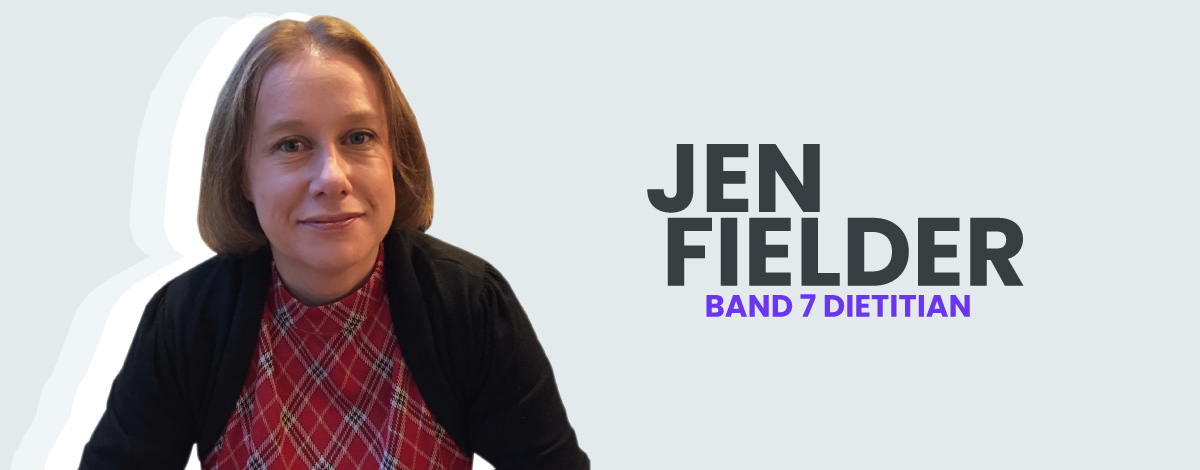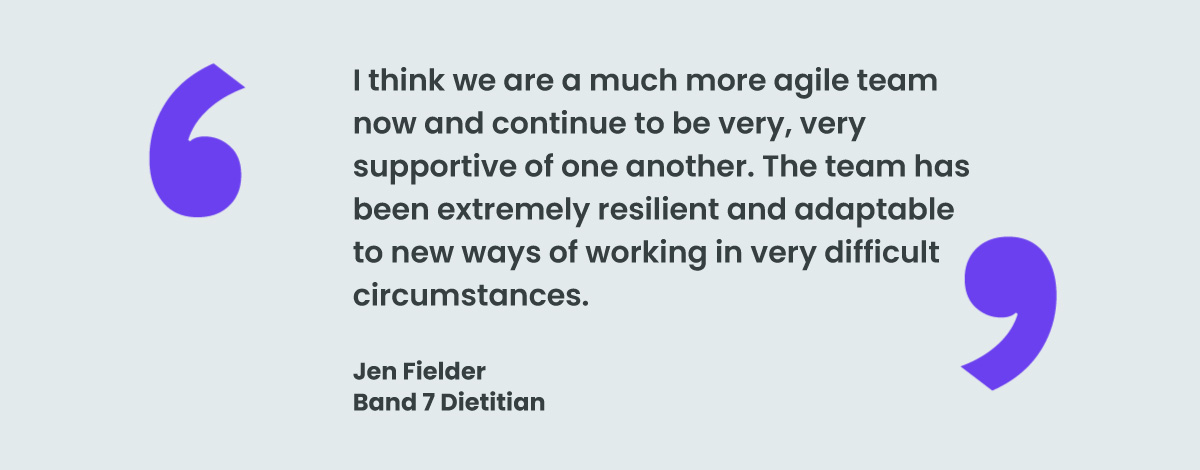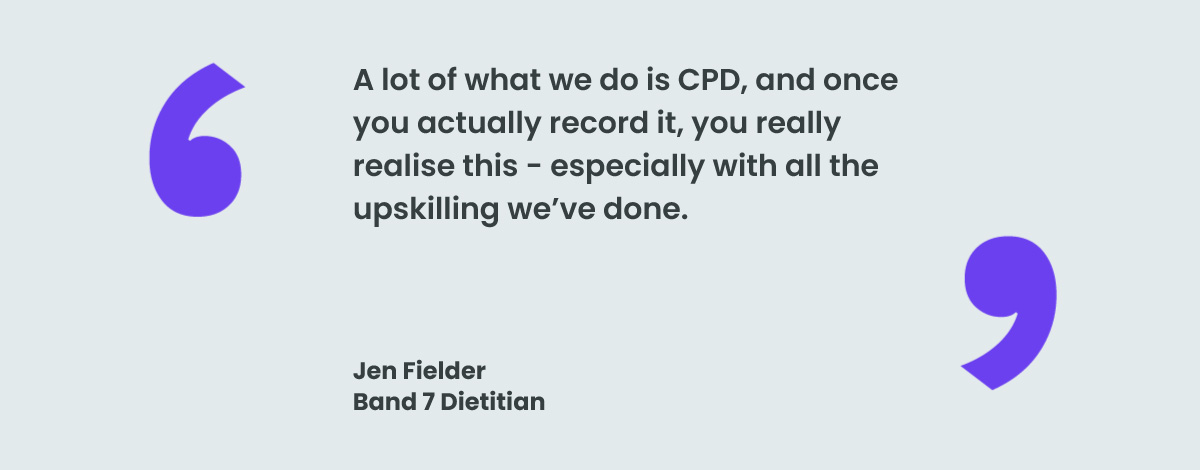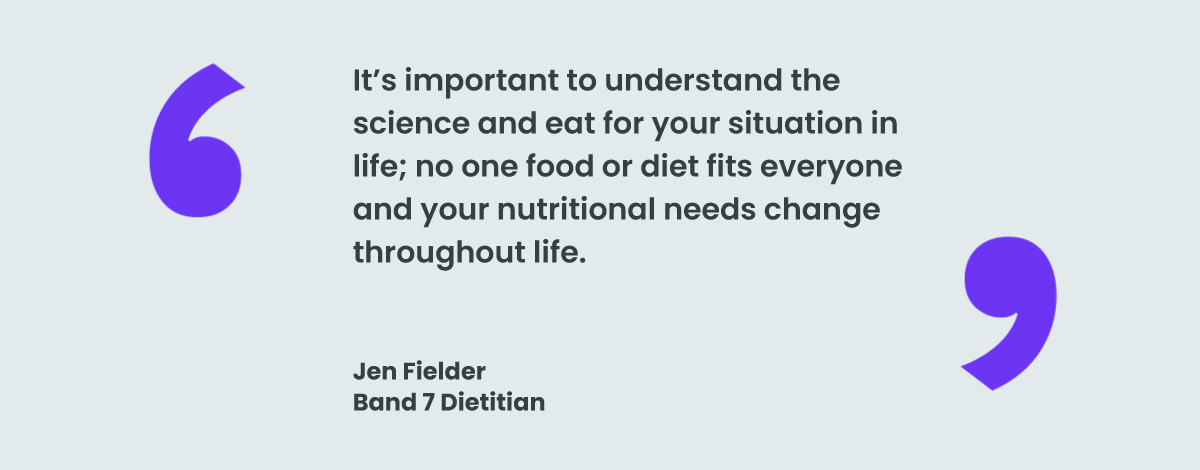Reflections with Julia: 'The nutrition part is often the easy bit!'
11 Jun 2021Interview
In this interview, we speak to Jen Fielder, a Band 7 dietitian based in East Sussex. She is Team Lead for the Community Nutrition Support team, part of the Nutrition and Dietetics Department for East Sussex Healthcare NHS Trust, which has grown enormously over the past 17 years since Jen joined the team.
Jen shares her experiences on becoming a dietitian, working out in the community and being part of an increasingly agile team. Plus, she includes some wise words for her past self.

Julia: Can you describe your job role?
Jen: “Our Department of nearly 50 (ranging from Band 2 to Band 8) covers two acute hospitals, two intermediate care facilities, and provides outpatient services for East Sussex. We’re divided into specialist teams, including acute, specialist community, community nutrition support, paediatrics, oncology and administration.
“When I joined the team 17 years ago, I think there were only 12 of us, and I was the only CNS team member. So we have grown enormously and, in the last year alone, we’ve had at least six new members join us just in CNS. The rest of the department has also grown; some new team members I have still not met in person due to the pandemic! Thankfully as we are now all experts (well, almost!) in using Microsoft Teams, we are all now well acquainted.
“I’m the team lead for the CNS team of fourteen people (not all full time within CNS). I’m responsible for the day-to-day operational running of the CNS team, with support from the other senior dietitians. This includes coordinating the team to ensure we have our caseload covered, providing clinical supervision and professional support to the team. In addition to this, I’m part of the senior management team for the whole department working with the other team leads to develop and move the department forward. I have a clinical caseload and many of the people I support have multiple medical conditions (both physiological and psychological), which can be complicated and challenging to balance. I'm also very fortunate to have some people on my caseload, who I have been supporting with their enteral feeds ever since I started with the department.
“Our CNS team sees anyone over the age of 16 who is malnourished or at risk of malnutrition. Many patients have a BMI of 18kg/m2 or less, with or without significant weight loss. We support people with both oral nutrition support and enteral nutritional support.
“There are a lot of reasons why someone might become malnourished, so we have to take a very holistic approach in trying to identify these factors with our patients. Aside from any health conditions, it could also be down to their environment or personal circumstances: for example, people living in temporary accommodation with very limited or no cooking facilities or fridges, Or perhaps someone dealing with the loss of a loved one and who struggles to shop and cook for themselves, or maybe someone who has never learnt what good nutrition is or how to shop for or prepare nourishing meals. Very often, there is not just one reason; there can be multiple barriers affecting someone's appetite and oral intake. This makes our caseload very diverse, interesting and challenging.
“The nutrition part is often the easy bit!”

Why did you become a dietitian?
“When I was at school, I was always interested in food and eating. My primary school teacher didn’t think I was clever enough to do the 11+, so having assumed I wasn’t academic, I decided to pursue my love of food by becoming a chef. I got a job in a restaurant kitchen and decided that I would go to catering college.
“But then, as my education progressed, I realised I could do more and decided to take A-levels to give myself more options. I looked into Dietetics and saw there were lots of career pathways available to me. So after doing very well at my GCSEs and A-levels, I got into The University of Surrey to do my Nutrition and Dietetics degree.
“It wasn’t an easy journey; having not studied biology at A-level, I really struggled with all the biology modules in the first year. But I’ve always been a very high achiever and, if I’m going to do something, I make sure I do it to the best of my ability. It was exhausting and, if I could go back, I would make sure I had more fun and didn’t push myself so much.
“However, I do love my job now. It's so interesting and, during the pandemic, I’ve enjoyed the challenge of needing to do things differently and upskill, often at short notice.”
Amongst the madness of the pandemic, have you learned anything new about yourself or your practice?
“I’ve learned I’m a much more social person than I thought I was. Now things have started opening back up, I’ve realised how much I have missed seeing family and friends. I have seen people in the office, but then was afraid of passing something on to others and so had become very isolated. I have really missed social contact with people. We are usually quite a social department and sadly, since the pandemic, we haven’t been able to meet up and do things as we would usually do.
“We’ve all experienced a lot of upskilling during the pandemic too. For example, we’ve had training in caring for patients in the ITU and those with specialist gastrointestinal disorders. This in-house training provided by the specialist dietitians in the department has enabled us to spread our resources and fill in capacity gaps as people were redeployed or needed to shield or self-isolate. It has given me opportunities to experience different specialities, which I may not have considered previously.
“I think we are a much more agile team now and continue to be very, very supportive of one another. The team has been extremely resilient and adaptable to new ways of working in very difficult circumstances. I'm really proud of the department and grateful to have had their support, help and guidance since joining the team; however, this has been even more valuable over the last 15 months.
“Now that things are starting to settle to a new ‘normality’, we are reflecting on the changes we have had to make to ensure our key services remained operational and how we can develop this further for the future. Due to the pandemic, we had to change the way we delivered the CNS service and historical geographical boundaries have been removed as we are now able to work remotely and make use of virtual appointments (both for our patients and for the team).
“We also introduced twice-weekly ‘Huddles’, which the whole CNS team can access virtually. This is a dedicated time to check in with each other as well as an opportunity to discuss complex or difficult cases within the CNS team; this not only gives an opportunity for peer support and clinical supervision, it also helps the whole team to learn and get to know our caseload in more detail. This means that if a call comes in about a patient, anyone in the team should feel comfortable making a start with dealing with the query. It also helps the patients get more comfortable talking to multiple team members rather than only dealing with one individual. Even with our more complex cases, I’m confident that if one of my patients rang in to speak to me when I wasn’t there, another team member would know of them (thanks to our huddles) and would assist in any way they could.”

What CPD activities have you been able to carry out in recent months? And what have you found most useful?
“A lot of what we do is CPD, and once you actually record it, you really realise this - especially with all the upskilling we’ve done.
“Because of the pandemic, our more frequent CNS huddles have been invaluable in providing peer-to-peer support. These help the junior members learn from the more experienced dietitians (and vice versa!) and enable all of us to learn from our acute team colleagues; some of the CNS team works 50% with us and 50% with the acute team.
“Team lead huddles also help us with HR support and supervision, as well as ensuring we all have a good overview of the capacity and demands faced by the whole department and the wider Trust. This information is then fed back to the CNS team (as well as the other specialist teams) via our regular huddles.
“We have regular safeguarding supervision sessions, which gives us dedicated time to talk with the Trust’s specialist safeguarding team about any concerns we have about our patients (or their relatives). This helps to ensure that vulnerable people get the appropriate help and support they need from the right clinicians or support workers and that any severe concerns, such as any suspicions around neglect or any type of abuse are escalated and investigated in the appropriate way. Due to our holistic approach, we sadly sometimes identify potential safeguarding concerns, as they can be contributing factors as to why someone has become malnourished. Therefore, it is important we ensure that the team has the skills and confidence to raise these concerns so that our patients receive the right support from an appropriate clinician to help improve their nutritional status in the long term.
“Another CPD activity I participate in is to have regular meetings (both 1:1 and with the whole CNS team) with our specialist Prescribing Support Dietitian. This gives me the opportunity to have my work and ideas peer-reviewed and for me to receive updates on new products and guidelines for appropriate prescribing on a regular basis.”
What are your favourite resources for keeping up with the latest advice, research and trends in the field of dietetics?
“Regular staff meetings and clinical updates from the team are really important, but I also use BAPEN (the British Association for Parenteral and Enteral Nutrition), PENG (Parenteral and Enteral Nutrition Group, a specialist group of the BDA), PEN (Practice-based Evidence in Nutrition), as well as the BDA. These help me keep up to date with trends nationally and globally. Many of the conferences they offer are on Zoom or Teams now, so they are much more accessible.”
How have you kept track of all your CPD activities in the past?
“I’ve had paper copies of stuff in ring binders, on the home computer, on the work computer, even floppy disks! Stuff everywhere. Now I use Julia to keep everything in one place.”
Do you regularly reflect on your CPD?
“When I trained as a dietitian, the training was very different to how it is now, as was the registration process. I don’t remember there being a huge amount of training around reflecting and, as a consequence, I find this hard to do, even now. As I wasn’t trained to do reflections, I’m not very good at sitting down and writing up my reflections, despite regularly reflecting in practice and with my colleagues. Often, finding a quiet space and time to do it is challenging.
“Students today have to keep up their reflective practice as part of their studies; the training has improved and more guidance is given whilst they’re at uni. Reflection is also a big part of clinical placements, which is great. However, people like me who are already in the profession, but find it difficult to do, may need a bit of extra support every now and then.”
If you could go back in time to your student-self, what piece of advice would you give yourself?
“Study less, and it will be OK! Don’t be so hard on yourself. And if you want to do something different, then do it. If you’re not enjoying the job you’re doing, move on.”

What food-related myth really annoys you?
“The labels that are attributed to food annoy me - “this food is bad: so don’t eat this, this food is good: eat this!”. When you label food in this way, it puts barriers up. This can lead to people imposing unnecessary restrictions on their diets as they may start to avoid foods that are considered ‘bad/unhealthy’. When you start restricting your diet in this way - especially if you try to follow all the advice in the press - and remove food groups or specific foods from your diet, you run the risk of having a nutritionally inadequate diet which, if you have a reduced appetite and you are losing weight unintentionally, can lead to serious negative health consequences in the long term, if the nutrients aren’t replaced by using alternative food sources.
“It’s important to understand the science and eat for your situation in life; no one food or diet fits everyone and your nutritional needs change throughout life.”
You are stranded on a deserted island. You can take a lifetime supply of one snack...what’s the snack?
“Crisps - bring them on!”
A huge thank you to Jen for taking the time to reflect with us on her experience. If you enjoyed this article and found it a valuable insight into the life of a dietitian, please share it on Twitter.
Julia helps you record, reflect, and report on your CPD through our website and app.
It's an easy way for you to stay on top of your CPD. Sign up for a 14 day free today.